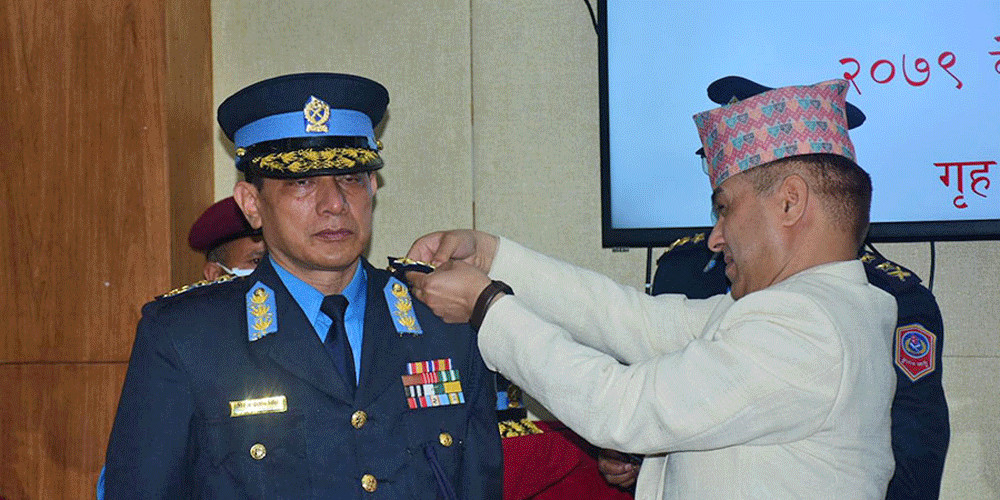Kathmandu, Dec. 22: The much-talked police personnel integration process has been in limbo for almost three years even after the introduction of Police Personnel Integration Act-2020.
Security officials and experts have blamed the federal government’s intention to dictate the police for the delay in the adjustment of the police in the provinces.
Authenticated on February 11, 2020, the Act was not implemented by the government citing various technical caveats. So the provincial governments have been demanding for immediate implementation of the Act and hand over of the authority to the province governments as mentioned in the constitution issued seven years back.
Even years after federalism came into effect, organization of the provincial police could not be restructured as per the constitution due to the lack of laws, regulations and other provisions related to police adjustment and distribution of powers, according to the government officials.
Two acts related to the adjustment of federal police into province have been issued so far. One is Police Personnel Integration Act, 2020 and the other is Nepal Police and Province Police (operation, supervision and coordination) Act, 2020 issued on February 11, 2020. The federal government had even undertaken the first amendment to the latter on September 28, 2020.
But regulations, guidelines and procedures have not been introduced in accordance with those laws. Organisation and Management (O&M) survey was conducted in October, 2020 for the purpose of adjustment, since various posts were added, there is an obligation to revise the report, according to Joint Secretary and Spokesperson for the Ministry of Home Affairs Fanindra Mani Pokharel.
Earlier, the ministers of all the seven provincial governments had repeatedly expressed their displeasure against the federal government for not proceeding with the adjustment. Madhes province was the most dissatisfied among the provinces. The Madhes government had even staged a sit-in before the November 20 elections.
In absence of the timely adjustment, all the seven province governments have been unable to recruit, transfer, promote and redeploy police separately in their provinces. In the provinces, the police are being deployed from the central level or Police Headquarters as of today.
Former Home Secretary Govinda Prasad Kusum commented that police adjustment did not go ahead because the federal government did not want to deliver the power to the province.
“Police adjustment has not been a priority of the federal government. All are focused on securing their own chairs. Now, since the election has been concluded, there is some ray of hope that this stalled process might move ahead.”
He also said the federal government was not willing to transfer the rights so easily which it has now. The federal government has been hesitating to transfer power to the provinces, he commented.
He said that since there was no atmosphere of trust between the federal and the provincial government, the adjustment of the police had not progressed.
Pokharel, the spokesperson for the Ministry of Home Affairs, said that police adjustment had not materialised as some homework was still pending. “Although the Act has been issued, there are still many other works related to it. The O&M survey of Nepal Police and Province Police related to the adjustment also needs to be updated,” he said.
“The drafting and issuance of legal documents such as regulations, guidelines, and procedures has not been completed. After they are finalized, the adjustment will proceed formally,” Pokharel said.
Spokesperson of Nepal Police, DIG Tek Prasad Rai claimed that they are constantly working for the adjustment of the police. Some legal bases for the adjustment has already been made, the Ministry of Home Affairs is also working on it.
The rest of the adjustment will be done by the ministry,” he said. “We will do our work after the instructions, decisions and circulars from the ministry. If someone violates the law and disrupts peace and security, the police will fulfill their responsibility,” Rai said.
An AIG of Nepal Police, who retired recently, commented that people in power and because of the fear of losing their rights, they were not proceeding adjustment process ahead and with much interest.
After the completion of the adjustment from the federal level, Province 1, Madhes, Bagmati and Gandaki Provinces had issued the Provincial Police Act to restructure of provincial police in their respective provinces. Province 1 had introduced the Provincial Police Act in June 2020, Province 2 which later named itself Madhes in August 2018, Bagmati in April 2020 and Gandaki in October 2020. The Province Police Bill had been registered in the Karnali Province Assembly on October 12, 2020. The Lumbini and Sudurpaschim governments have not brought the provincial police bill yet.
In the Organisation and Management (O&M) survey report on police adjustment passed by the Council of Ministers on November 12, 2020, it is mentioned that by maintaining the total number of police personnel at 79,532, Nepal Police will keep 24,812 personnel in the centre and 54,720 personnel in seven provinces.
However, since the regulations, guidelines and procedures related to supervision and coordination of adjustment and operation have not been made, the adjustment is not in a position to proceed. Further, the law regarding service and conditions of Nepal Police is yet to be issued.




COMMENTS